爱乐奇新概念英语2第60课练习题答案
新概念第二册60课
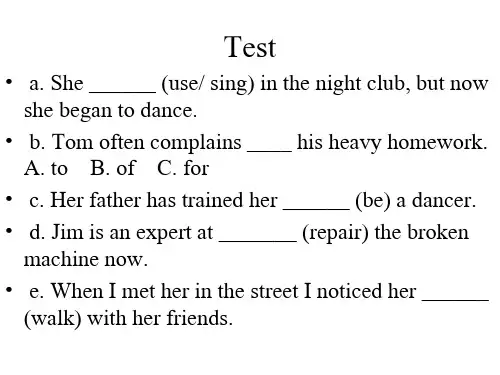
future: n. 未来,前途 在未来 • in the future_______ 在不久的未来 • in future _____________ • = in the near future
•
• 在未来,我们能够参观宇 宙中所有星球。 the future, we will visit • In ______________________ all the planets _____________in universe.
•will do 和be going to do区别: will do是没有计划 ________的,随时想到的, 而且马上就会做的。 如:---What time is it now? ---I don’t know. I’ll check my mobile. 计划打算。 be going to do表示________ 。 如:---Why are you so busy recently? ---I’m going to get married next month, so I’m preparing for my wedding. 再对比: ---I am going to climb the tree. ---Oh, no! You will fall off the tree.
• 请用will do或be going to do来填空: • 1. —Come to the party. 来参加晚会吧。 am going to • —OK,I _____________bring my friend. 好的, 我把我的朋友也带来。 • 2. —Where is the telephone book? will • —I __________ get it for you. 我去给你拿。 3. —Why are you taking it out? 干吗要把它拿出来? am going to • —I __________wash it. 我想把它洗一洗。 • 4. —Have you bought a typewriter? am going to • —Yes. I ___________learn to type. 是的,我想学 打字。
新概念二第60课同步练习
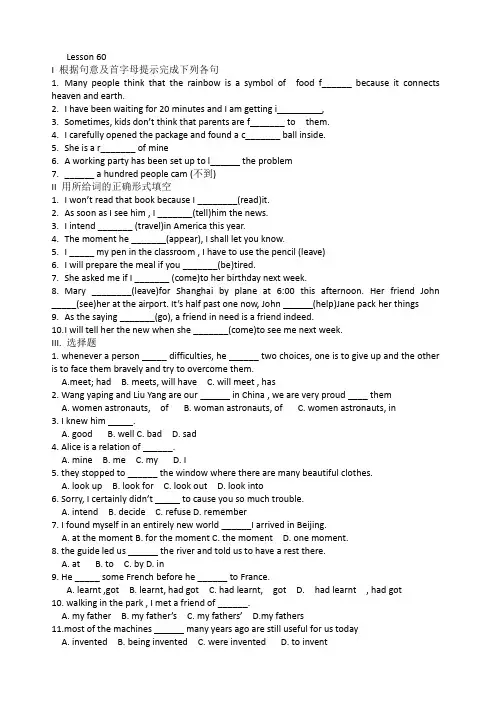
Lesson 60I 根据句意及首字母提示完成下列各句1.Many people think that the rainbow is a symbol of food f______ because it connects heaven and earth.2.I have been waiting for 20 minutes and I am getting i_________,3.Sometimes, kids don’t think that parents are f_______ to them.4.I carefully opened the package and found a c_______ ball inside.5.She is a r_______ of mine6.A working party has been set up to l______ the problem7.______ a hundred people cam (不到)II 用所给词的正确形式填空1.I won’t read that book because I ________(read)it.2.As soon as I see him , I _______(tell)him the news.3.I intend _______ (travel)in America this year.4.The moment he _______(appear), I shall let you know.5.I _____ my pen in the classroom , I have to use the pencil (leave)6.I will prepare the meal if you _______(be)tired.7.She asked me if I _______ (come)to her birthday next week.8.Mary ________(leave)for Shanghai by plane at 6:00 this afternoon. Her friend John _____(see)her at the airport. It’s half past one now, John ______(help)Jane pack her things9.As the saying _______(go), a friend in need is a friend indeed.10.I will tell her the new when she _______(come)to see me next week.III. 选择题1. whenever a person _____ difficulties, he ______ two choices, one is to give up and the other is to face them bravely and try to overcome them.A.meet; hadB. meets, will haveC. will meet , has2. Wang yaping and Liu Yang are our ______ in China , we are very proud ____ themA. women astronauts, ofB. woman astronauts, ofC. women astronauts, in3. I knew him _____.A. goodB. wellC. badD. sad4. Alice is a relation of ______.A. mineB. meC. myD. I5. they stopped to ______ the window where there are many beautiful clothes.A. look upB. look forC. look outD. look into6. Sorry, I certainly didn’t _____ to cause you so much trouble.A. intendB. decideC. refuseD. remember7. I found myself in an entirely new world ______I arrived in Beijing.A. at the momentB. for the momentC. the momentD. one moment.8. the guide led us ______ the river and told us to have a rest there.A. atB. toC. byD. in9. He _____ some French before he ______ to France.A. learnt ,gotB. learnt, had gotC. had learnt, gotD. had learnt , had got10. walking in the park , I met a friend of ______.A. my fatherB. my father’sC. my fathers’D.my fathers11.most of the machines ______ many years ago are still useful for us todayA. inventedB. being inventedC. were inventedD. to invent12. He interrupted me ______ when I was telling him about that .A. impatientlyB. impossiblyC. impatientD. impossible13.There ______ a party tomorrow evening.A. will be going toB. will go to beC. will going to beD. is going to beIv 句型转换1.She will send us a message , she will arrive (用as soon as 连接句子)2.I will go to see my uncle, my sister will come (用not ...until 连接句子)3.it will rain tomorrow , we will call off the football match(用if连接句子)4.You will fail in French, you will study harder (用unless 连接句子)5。
新概念2册练习册 Lesson 60 Homework 教师版
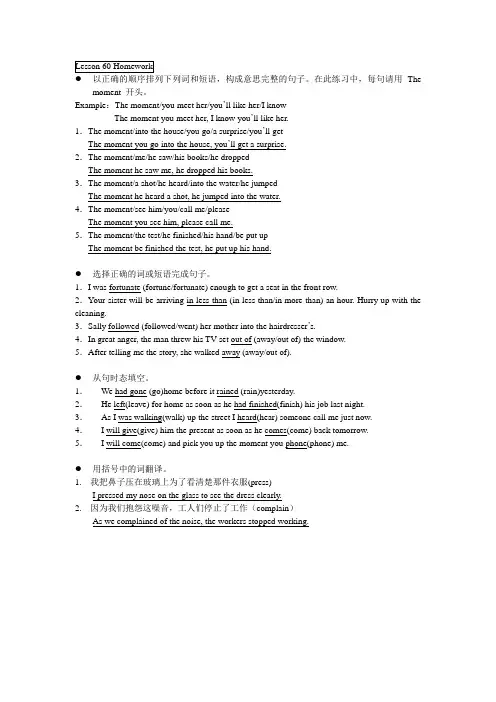
●以正确的顺序排列下列词和短语,构成意思完整的句子。
在此练习中,每句请用Themoment 开头。
Example:The moment/you meet her/you’ll like her/I knowThe moment you meet her, I know you’ll like her.1.The moment/into the house/you go/a surprise/you’ll getThe moment you go into the house, you’ll get a surprise.2.The moment/me/he saw/his books/he droppedThe moment he saw me, he dropped his books.3.The moment/a shot/he heard/into the water/he jumpedThe moment he heard a shot, he jumped into the water.4.The moment/see him/you/call me/pleaseThe moment you see him, please call me.5.The moment/the test/he finished/his hand/be put upThe moment be finished the test, he put up his hand.●选择正确的词或短语完成句子。
1.I was fortunate (fortune/fortunate) enough to get a seat in the front row.2.Your sister will be arriving in less than (in less than/in more than) an hour. Hurry up with the cleaning.3.Sally followed (followed/went) her mother into the hairdresser’s.4.In great anger, the man threw his TV set out of (away/out of) the window.5.After telling me the story, she walked away (away/out of).●从句时态填空。
新概念英语第二册课后练习题答案详解(第60课)
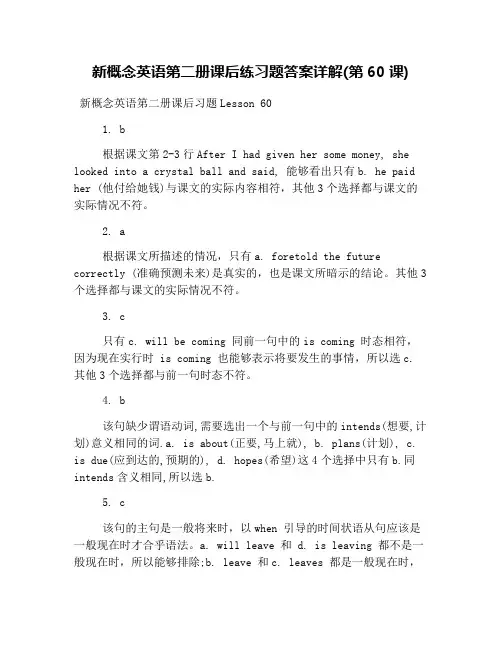
新概念英语第二册课后练习题答案详解(第60课)新概念英语第二册课后习题Lesson 601. b根据课文第2-3行After I had given her some money, she looked into a crystal ball and said, 能够看出只有b. he paid her (他付给她钱)与课文的实际内容相符,其他3个选择都与课文的实际情况不符。
2. a根据课文所描述的情况,只有a. foretold the future correctly (准确预测未来)是真实的,也是课文所暗示的结论。
其他3个选择都与课文的实际情况不符。
3. c只有c. will be coming 同前一句中的is coming 时态相符,因为现在实行时 is coming 也能够表示将要发生的事情,所以选c. 其他3个选择都与前一句时态不符。
4. b该句缺少谓语动词,需要选出一个与前一句中的intends(想要,计划)意义相同的词.a. is about(正要,马上就), b. plans(计划), c. is due(应到达的,预期的), d. hopes(希望)这4个选择中只有b.同intends含义相同,所以选b.5. c该句的主句是一般将来时,以when 引导的时间状语从句应该是一般现在时才合乎语法。
a. will leave 和 d. is leaving 都不是一般现在时,所以能够排除;b. leave 和c. leaves 都是一般现在时,但是因为从句的主语是he, 而且c. leaves 是动词第3人称单数形式,最合乎语法,所以c.是准确答案。
6. b只有b. will be surprised (会感到惊讶)同前一句的will get a surprise 含义相同,所以b.是准确答案。
a. will surprise 不合乎语法,因为surprise 是及物动词,后面应该有宾语,surprise 常用被动语态,表示感到惊讶;c. surprise 也不合乎语法;d. will be surprising 意义上不准确,be surprising 表示“令人惊奇的”,与前一句意思不符。
新概念应第二册课后练习答案lesson51--60
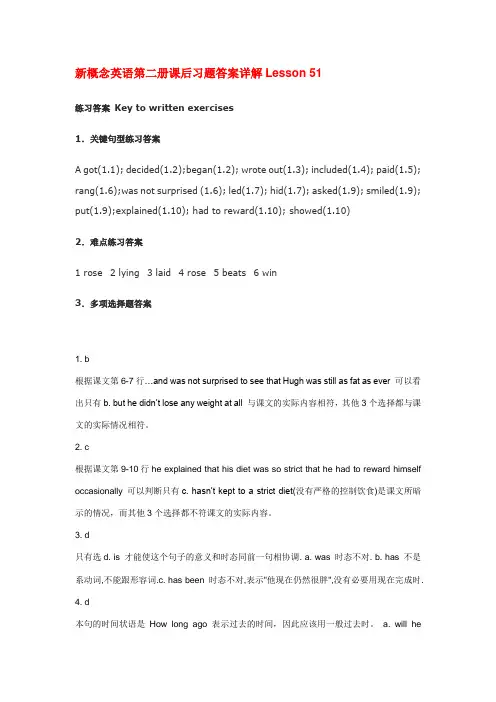
新概念英语第二册课后习题答案详解Lesson 51练习答案Key to written exercises1.关键句型练习答案A got(1.1); decided(1.2);began(1.2); wrote out(1.3); included(1.4); paid(1.5); rang(1.6);was not surprised (1.6); led(1.7); hid(1.7); asked(1.9); smiled(1.9); put(1.9);explained(1.10); had to reward(1.10); showed(1.10)2.难点练习答案1 rose2 lying3 laid4 rose5 beats6 win3.多项选择题答案1. b根据课文第6-7行…and was not surprised to see that Hugh was still as fat as ever 可以看出只有b. but he didn’t lose any weight at all 与课文的实际内容相符,其他3个选择都与课文的实际情况相符。
2. c根据课文第9-10行he explained that his diet was so strict that he had to reward himself occasionally 可以判断只有c. hasn’t kept to a strict diet(没有严格的控制饮食)是课文所暗示的情况,而其他3个选择都不符课文的实际内容。
3. d只有选d. is 才能使这个句子的意义和时态同前一句相协调. a. was 时态不对. b. has 不是系动词,不能跟形容词.c. has been 时态不对,表示"他现在仍然很胖",没有必要用现在完成时.4. d本句的时间状语是How long ago 表示过去的时间,因此应该用一般过去时。
新版新概念英语第二册课后练习答案.doc
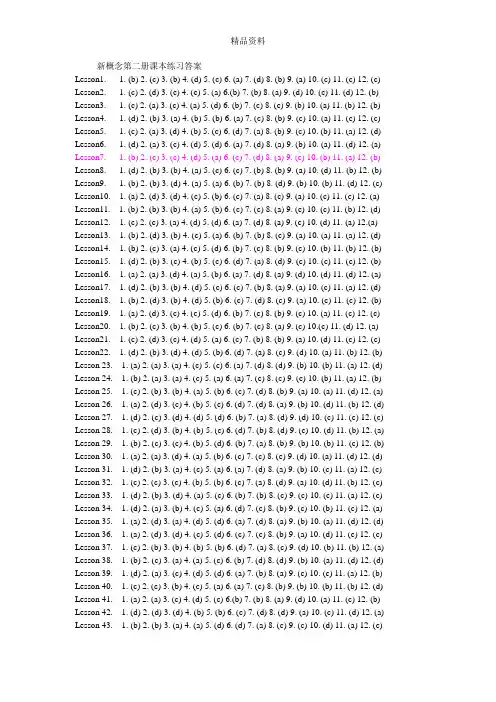
新概念第二册课本练习答案Lesson1. 1. (b) 2. (c) 3. (b) 4. (d) 5. (c) 6. (a) 7. (d) 8. (b) 9. (a) 10. (c) 11. (c) 12. (c) Lesson2. 1. (c) 2. (d) 3. (c) 4. (c) 5. (a) 6.(b) 7. (b) 8. (a) 9. (d) 10. (c) 11. (d) 12. (b) Lesson3. 1. (c) 2. (a) 3. (c) 4. (a) 5. (d) 6. (b) 7. (c) 8. (c) 9. (b) 10. (a) 11. (b) 12. (b) Lesson4. 1. (d) 2. (b) 3. (a) 4. (b) 5. (b) 6. (a) 7. (c) 8. (b) 9. (c) 10. (a) 11. (c) 12. (c) Lesson5. 1. (c) 2. (a) 3. (d) 4. (b) 5. (c) 6. (d) 7. (a) 8. (b) 9. (c) 10. (b) 11. (a) 12. (d) Lesson6. 1. (d) 2. (a) 3. (c) 4. (d) 5. (d) 6. (a) 7. (d) 8. (a) 9. (b) 10. (a) 11. (d) 12. (a) Lesson7. 1. (b) 2. (c) 3. (c) 4. (d) 5. (a) 6. (c) 7. (d) 8. (a) 9. (c) 10. (b) 11. (a) 12. (b) Lesson8. 1. (d) 2. (b) 3. (b) 4. (a) 5. (c) 6. (c) 7. (b) 8. (b) 9. (a) 10. (d) 11. (b) 12. (b) Lesson9. 1. (b) 2. (b) 3. (d) 4. (a) 5. (a) 6. (b) 7. (b) 8. (d) 9. (b) 10. (b) 11. (d) 12. (c) Lesson10. 1. (a) 2. (d) 3. (d) 4. (c) 5. (b) 6. (c) 7. (a) 8. (c) 9. (a) 10. (c) 11. (c) 12. (a) Lesson11. 1. (b) 2. (b) 3. (b) 4. (a) 5. (b) 6. (c) 7. (c) 8. (a) 9. (c) 10. (c) 11. (b) 12. (d) Lesson12. 1. (c) 2. (c) 3. (a) 4. (d) 5. (d) 6. (a) 7. (d) 8. (a) 9. (c) 10. (d) 11. (a) 12.(a) Lesson13. 1. (b) 2. (d) 3. (b) 4. (c) 5. (a) 6. (b) 7. (b) 8. (c) 9. (a) 10. (a) 11. (a) 12. (d) Lesson14. 1. (b) 2. (c) 3. (a) 4. (c) 5. (d) 6. (b) 7. (c) 8. (b) 9. (c) 10. (b) 11. (b) 12. (b) Lesson15. 1. (d) 2. (b) 3. (c) 4. (b) 5. (c) 6. (d) 7. (a) 8. (d) 9. (c) 10. (c) 11. (c) 12. (b) Lesson16. 1. (a) 2. (a) 3. (d) 4. (a) 5. (b) 6. (a) 7. (d) 8. (a) 9. (d) 10. (d) 11. (d) 12. (a) Lesson17. 1. (d) 2. (b) 3. (b) 4. (d) 5. (c) 6. (c) 7. (b) 8. (a) 9. (a) 10. (c) 11. (a) 12. (d) Lesson18. 1. (b) 2. (d) 3. (b) 4. (d) 5. (b) 6. (c) 7. (d) 8. (c) 9. (a) 10. (c) 11. (c) 12. (b) Lesson19. 1. (a) 2. (d) 3. (c) 4. (c) 5. (d) 6. (b) 7. (c) 8. (b) 9. (c) 10. (a) 11. (c) 12. (c) Lesson20. 1. (b) 2. (c) 3. (b) 4. (b) 5. (c) 6. (b) 7. (c) 8. (a) 9. (c) 10.(c) 11. (d) 12. (a) Lesson21. 1. (c) 2. (d) 3. (c) 4. (d) 5. (a) 6. (c) 7. (b) 8. (b) 9. (a) 10. (d) 11. (c) 12. (c) Lesson22. 1. (d) 2. (b) 3. (d) 4. (d) 5. (b) 6. (d) 7. (a) 8. (c) 9. (d) 10. (a) 11. (b) 12. (b) Lesson 23. 1. (a) 2. (a) 3. (a) 4. (c) 5. (c) 6. (a) 7. (d) 8. (d) 9. (b) 10. (b) 11. (a) 12. (d) Lesson 24. 1. (b) 2. (a) 3. (a) 4. (c) 5. (a) 6. (a) 7. (c) 8. (c) 9. (c) 10. (b) 11. (a) 12. (b) Lesson 25. 1. (c) 2. (b) 3. (b) 4. (a) 5. (b) 6. (c) 7. (d) 8. (b) 9. (a) 10. (a) 11. (d) 12. (a) Lesson 26. 1. (a) 2. (d) 3. (c) 4. (b) 5. (c) 6. (d) 7. (d) 8. (a) 9. (b) 10. (d) 11. (b) 12. (d) Lesson 27. 1. (d) 2. (c) 3. (d) 4. (d) 5. (d) 6. (b) 7. (a) 8. (d) 9. (d) 10. (c) 11. (c) 12. (c) Lesson 28. 1. (c) 2. (d) 3. (b) 4. (b) 5. (c) 6. (d) 7. (b) 8. (d) 9. (c) 10. (d) 11. (b) 12. (a) Lesson 29. 1. (b) 2. (c) 3. (c) 4. (b) 5. (d) 6. (b) 7. (a) 8. (b) 9. (b) 10. (b) 11. (c) 12. (b) Lesson 30. 1. (a) 2. (a) 3. (d) 4. (a) 5. (b) 6. (c) 7. (c) 8. (c) 9. (d) 10. (a) 11. (d) 12. (d) Lesson 31. 1. (d) 2. (b) 3. (a) 4. (c) 5. (a) 6. (a) 7. (d) 8. (a) 9. (b) 10. (c) 11. (a) 12. (c) Lesson 32. 1. (c) 2. (c) 3. (c) 4. (b) 5. (b) 6. (c) 7. (a) 8. (d) 9. (a) 10. (d) 11. (b) 12. (c) Lesson 33. 1. (d) 2. (b) 3. (d) 4. (a) 5. (c) 6. (b) 7. (b) 8. (c) 9. (c) 10. (c) 11. (a) 12. (c) Lesson 34. 1. (d) 2. (a) 3. (b) 4. (c) 5. (a) 6. (d) 7. (c) 8. (b) 9. (c) 10. (b) 11. (c) 12. (a) Lesson 35. 1. (a) 2. (d) 3. (a) 4. (d) 5. (d) 6. (a) 7. (d) 8. (a) 9. (b) 10. (a) 11. (d) 12. (d) Lesson 36. 1. (a) 2. (d) 3. (d) 4. (c) 5. (d) 6. (c) 7. (c) 8. (b) 9. (a) 10. (d) 11. (c) 12. (c) Lesson 37. 1. (c) 2. (b) 3. (b) 4. (b) 5. (b) 6. (d) 7. (a) 8. (c) 9. (d) 10. (b) 11. (b) 12. (a) Lesson 38. 1. (b) 2. (c) 3. (a) 4. (a) 5. (c) 6. (b) 7. (d) 8. (d) 9. (b) 10. (a) 11. (d) 12. (d) Lesson 39. 1. (d) 2. (a) 3. (c) 4. (d) 5. (d) 6. (a) 7. (b) 8. (a) 9. (c) 10. (c) 11. (a) 12. (b) Lesson 40. 1. (c) 2. (c) 3. (b) 4. (c) 5. (a) 6. (a) 7. (c) 8. (b) 9. (b) 10. (b) 11. (b) 12. (d) Lesson 41. 1. (a) 2. (a) 3. (c) 4. (d) 5. (c) 6.(b) 7. (b) 8. (a) 9. (d) 10. (a) 11. (c) 12. (b) Lesson 42. 1. (d) 2. (d) 3. (d) 4. (b) 5. (b) 6. (c) 7. (d) 8. (d) 9. (a) 10. (c) 11. (d) 12. (a) Lesson 43. 1. (b) 2. (b) 3. (a) 4. (a) 5. (d) 6. (d) 7. (a) 8. (c) 9. (c) 10. (d) 11. (a) 12. (c)Lesson 45. 1. (b) 2. (d) 3. (a) 4. (b) 5. (b) 6. (d) 7. (c) 8. (b) 9. (c) 10. (b) 11. (d) 12. (b) Lesson 46. 1. (a) 2. (c) 3. (d) 4. (d) 5. (a) 6. (c) 7. (b) 8. (c) 9. (a) 10. (d) 11. (c) 12. (a) Lesson 47. 1. (d) 2. (a) 3. (b) 4. (a) 5. (d) 6. (a) 7. (a) 8. (d) 9. (d) 10. (c) 11. (a) 12. (c) Lesson 48. 1. (c) 2. (b) 3. (c) 4. (b) 5. (a) 6. (c) 7. (b) 8. (b) 9. (d) 10. (a) 11. (b) 12. (c) Lesson 49. 1. (d) 2. (a) 3. (b) 4. (a) 5. (b) 6. (c) 7. (c) 8. (a) 9. (c) 10. (c) 11. (a) 12. (a) Lesson 50. 1. (b) 2. (d) 3. (a) 4. (c) 5. (c) 6. (a) 7. (a) 8. (d) 9. (b) 10. (b) 11. (c) 12. (d) Lesson 51. 1. (b) 2. (c) 3. (d) 4. (d) 5. (d) 6. (a) 7. (d) 8. (c) 9. (a) 10. (d) 11. (d) 12. (b) Lesson 52. 1. (b) 2. (c) 3. (c) 4. (a) 5. (b) 6. (d) 7. (c) 8. (b) 9. (a) 10. (c) 11. (b) 12. (d) Lesson 53. 1. (c) 2. (d) 3. (a) 4. (c) 5. (c) 6. (c) 7. (d) 8. (c) 9. (d) 10. (a) 11. (c) 12. (c) Lesson 54. 1. (d) 2. (b) 3. (d) 4. (b) 5.(d) 6. (b) 7. (a) 8. (d) 9. (c) 10. (b) 11. (d) 12. (d) Lesson 55. 1. (a) 2. (a) 3. (b) 4. (d) 5. (a) 6. (a) 7. (c) 8. (a) 9. (b) 10. (d) 11. (a) 12. (b) Lesson 56. 1. (c) 2. (a) 3. (c) 4. (c) 5. (a) 6. (c) 7. (a) 8. (b) 9. (b) 10. (c) 11. (c) 12. (c) Lesson 57. 1. (a) 2. (b) 3. (b) 4. (b) 5. (b) 6. (d) 7. (c) 8. (d) 9. (c) 10. (b) 11. (d) 12. (a) Lesson 58. 1. (b) 2. (d) 3. (a) 4. (a) 5. (c) 6. (b) 7. (d) 8. (c) 9. (a) 10. (d) 11. (b) 12. (d) Lesson 59. 1. (d) 2. (b) 3. (d) 4. (d) 5. (d) 6. (a) 7. (b) 8. (a) 9. (d) 10. (a) 11. (a) 12. (b) Lesson 60. 1. (b) 2. (a) 3. (c) 4. (b) 5. (c) 6. (b) 7. (a) 8. (b) 9. (a) 10. (c) 11. (a) 12. (d) Lesson 61. 1. (b) 2. (a) 3. (c) 4. (c) 5. (a) 6. (d) 7. (c) 8. (a) 9. (b) 10. (b) 11. (d) 12. (d) Lesson 62. 1. (a)2. (d) 3. (d) 4. (c) 5. (d) 6. (c) 7. (c) 8. (b) 9. (d) 10. (a) 11. (d) 12. (b) Lesson 63. 1. (d) 2. (b) 3. (a) 4. (a) 5. (b) 6. (d) 7. (d) 8. (a) 9. (c) 10. (d) 11. (c) 12. (a) Lesson 64. 1. (c) 2. (c) 3. (c) 4. (c) 5. (b) 6. (b) 7. (c) 8. (c) 9. (a) 10. (b) 11. (b) 12. (b) Lesson 65. 1. (a) 2. (d) 3. (b) 4. (b) 5. (c) 6. (a) 7. (a) 8. (d) 9. (c) 10. (c) 11. (b) 12. (d) Lesson 66. 1. (c) 2. (b) 3. (a) 4. (a) 5. (d) 6. (a) 7. (a) 8. (b) 9. (a) 10. (b) 11. (b) 12. (a) Lesson 67. 1. (d) 2. (a) 3. (d) 4.(d) 5. (d) 6. (d) 7. (b) 8. (b) 9. (a) 10. (d) 11. (d) 12. (d) Lesson 68. 1. (b) 2. (b) 3. (c) 4. (d) 5. (b) 6. (b) 7. (b) 8. (c) 9. (c) 10. (c) 11. (a) 12. (a) Lesson 69. 1. (a) 2. (b) 3. (c) 4. (b) 5. (b) 6. (c) 7. (d) 8. (a) 9. (a) 10. (b) 11. (c) 12. (d) Lesson 70. 1. (d) 2. (b) 3. (c) 4. (c) 5. (d) 6. (b) 7. (c) 8. (a) 9. (c) 10. (d) 11. (d) 12. (c) Lesson 71. 1. (b) 2. (d) 3. (b) 4. (b) 5. (c) 6. (c) 7. (d) 8. (b) 9. (b) 10. (c) 11. (b) 12. (a) Lesson 72. 1. (a) 2. (c) 3. (a) 4. (d) 5. (b) 6. (a) 7. (c) 8. (c) 9. (d) 10. (b) 11. (a) 12. (d) Lesson 73. 1. (c) 2. (a) 3. (d) 4. (a) 5. (c) 6. (d) 7. (a) 8. (d) 9. (a) 10. (a) 11. (d) 12. (b) Lesson 74. 1. (b) 2. (d) 3. (c) 4. (c) 5. (d) 6. (c) 7. (a) 8. (c) 9. (b) 10. (c) 11. (a) 12. (b) Lesson 75. 1. (c) 2. (a) 3. (b) 4. (d) 5. (b) 6. (a) 7. (b) 8. (b) 9. (d) 10. (d) 11. (c) 12. (c) Lesson 76. 1. (d) 2. (b) 3. (d) 4. (a) 5. (a) 6. (b) 7. (b) 8. (a) 9. (c) 10. (b) 11. (d) 12. (d) Lesson 77. 1. (a) 2. (c) 3. (a) 4. (b) 5. (c) 6. (d) 7. (d) 8. (d) 9. (a) 10. (a) 11. (b) 12. (a) Lesson 78. 1. (a) 2. (c) 3. (b) 4. (b) 5. (c) 6. (a) 7. (c) 8. (b) 9. (a) 10. (b) 11. (c) 12. (a) Lesson 79. 1. (b) 2. (d) 3. (c) 4. (c) 5. (a) 6. (d) 7. (b) 8. (a) 9. (d) 10. (a) 11. (a) 12. (c) Lesson 80. 1. (c) 2. (b) 3. (d) 4. (a) 5. (d) 6. (c) 7. (a) 8. (d) 9. (c) 10. (c) 11. (d) 12. (b) Lesson 81. 1. (d) 2. (a) 3. (a) 4. (d) 5. (b) 6. (b) 7. (d) 8. (c) 9. (b) 10. (d) 11. (b) 12. (d) Lesson 82. 1. (a) 2. (b) 3. (a) 4. (d) 5. (c) 6. (c) 7. (d) 8. (a) 9. (a) 10. (c) 11. (b) 12. (d) Lesson 83. 1. (b) 2. (a) 3. (c) 4. (c) 5. (a) 6. (b) 7. (c) 8. (b) 9. (c) 10. (d) 11. (a) 12. (b) Lesson 84. 1. (c) 2. (c) 3. (a) 4. (b) 5. (d) 6. (c) 7. (c) 8. (c) 9. (d) 10. (a) 11. (c) 12. (d) Lesson 85. 1. (d) 2. (d) 3. (b) 4. (a) 5. (b) 6. (a) 7. (b) 8. (d) 9. (b) 10. (b) 11. (d) 12. (c) Lesson 86. 1. (b) 2. (c) 3. (a) 4. (b) 5. (b) 6. (b) 7. (d) 8. (c) 9. (a) 10. (b) 11. (b) 12. (c) Lesson 87. 1. (c) 2. (d) 3. (c) 4. (d) 5. (a) 6. (c) 7. (c) 8. (a) 9. (d) 10. (a) 11. (a) 12. (d)Lesson 89. 1. (a) 2. (a) 3. (d) 4. (a) 5. (d) 6. (d) 7. (a) 8. (d) 9. (b) 10. (d) 11. (d) 12. (b) Lesson 90. 1. (b) 2. (c) 3. (c) 4. (c) 5. (a) 6. (b) 7. (c) 8. (b) 9. (a) 10. (d) 11. (d) 12. (d) Lesson 91. 1. (d) 2. (b) 3. (c) 4. (b) 5. (c) 6. (d) 7. (b) 8. (b) 9. (c) 10. (b) 11. (c) 12. (b) Lesson 92. 1. (b) 2. (c) 3. (d) 4. (c) 5. (b) 6. (a) 7. (b) 8. (b) 9. (a) 10. (d) 11. (c) 12. (a) Lesson 93. 1. (c) 2. (d) 3. (b) 4. (a) 5. (c) 6. (c) 7. (c) 8. (d) 9. (c) 10. (b) 11. (d) 12. (b) Lesson 94. 1. (a) 2. (b) 3. (c) 4. (b) 5. (a) 6. (d) 7. (a) 8. (c) 9. (d) 10. (a) 11. (b) 12. (c) Lesson 95. 1. (d) 2. (a) 3. (b) 4. (a) 5. (d) 6. (c) 7. (d) 8. (c) 9. (a) 10. (c) 11. (d) 12. (c) Lesson 96. 1. (d) 2. (c) 3. (c) 4. (b) 5. (a) 6. (d) 7. (c) 8. (d) 9. (a) 10. (b) 11. (c) 12. (b)1、Thank you very much for taking me with you on that splendid outing to London. It was the first time that I had seenthe Tower or any of the other famous sights. If I'd gone alone, I couldn't have seen nearly as much, because I wouldn'thave known my way about.The weather was splendid on that day, which I thought was rare. I still remember some peopletold me that in Britain there was weather and no climate. During the same day, it might snow in the morning, rainat noon, shine in the afternoon and be windy before the night falls. So I think I was lucky。
新概念二Lesson60TheFuture
新概念二Lesson60TheFutureLesson 60 The Future at a village fair decide to visit a fortune-teller called 。
tell sb. to sit down a crystal ball will be arriving intend to do stay for a few days在乡村集市上决定参观一个叫。
的算命人告诉某人坐下一个水晶球将要来打算做。
多呆几天get a big surprise 大吃一惊a woman you know well 你比较了解的女士rush towards 。
向。
冲过去forget all about 忘干净ask impatiently 不耐烦地问must be at the station 一定在车站follow sb. to do sth. 跟随某人做事out of the fair 走出集市Structure points and key words: At a village fair, I decided to visit a fortune teller called Madam Bellingsky. Do you believe what a fortune-teller said? Fair 交易会Guangzhou Fair 广交会Fair a.公平的unfair. It’s unfair. 这是不公平的。
The world is unfair, but God is fair. fair a : beautiful Mirror, mirror on the wall, who is the fairest of them all?Fortunately.. Unfortunately...Fortunately 。
幸运的是。
Unfortunately 。
新概念英语第二册课后题答案详解Lesson60
新概念英语第二册课后题答案详解Lesson601. b根据课文第2-3行After I had given her some money, she looked into a crystal ball and said, 能够看出只有b. he paid her (他付给她钱)与课文的实际内容相符,其他3个选择都与课文的实际情况不符。
2. a根据课文所描述的情况,只有a. foretold the futurecorrectly (准确预测未来)是真实的,也是课文所暗示的结论。
其他3个选择都与课文的实际情况不符。
3. c只有c. will be coming 同前一句中的is coming 时态相符,因为现在实行时 is coming 也能够表示将要发生的事情,所以选c.其他3个选择都与前一句时态不符。
4. b该句缺少谓语动词,需要选出一个与前一句中的intends(想要,计划)意义相同的词.a. is about(正要,马上就), b. plans(计划), c.is due(应到达的,预期的), d. hopes(希望)这4个选择中只有b.同intends含义相同,所以选b.5. c该句的主句是一般将来时,以when 引导的时间状语从句应该是一般现在时才合乎语法。
a. will leave 和 d. is leaving 都不是一般现在时,所以能够排除;b. leave 和c. leaves 都是一般现在时,但是因为从句的主语是he, 而且c. leaves 是动词第3人称单数形式,最合乎语法,所以c.是准确答案。
6. b只有b. will be surprised (会感到惊讶)同前一句的will get a surprise 含义相同,所以b.是准确答案。
a. will surprise 不合乎语法,因为surprise 是及物动词,后面应该有宾语,surprise 常用被动语态,表示感到惊讶;c. surprise 也不合乎语法;d. will be surprising 意义上不准确,be surprising 表示“令人惊奇的”,与前一句意思不符。
最新新概念二册-49-60课测验(含答案)
最新新概念二册-49-60课测验(含答案)新概念二册三期期中测验姓名:____________ 一,选词填空(每题2分,共40分)pressure relive opponent effort sight blow rapidly display burn chargecalm suffer survive last gather ancient recognize dream shame stamp1,He stood there until the train went out of ____________.2,You should put to ____________ by what you’ve just done.3,We ____________ of buying a house in the country.4,The babysitter was in ____________ of the kids while the parents were out.5,So I’m sure to get opportunities to ____________ my talent in painting.6,We will all have a course in ____________ history this term.7,I tried to comfort him after he was defeated by his ____________.8,She is willing to make her ____________ to win the competition.9,She could hardly ____________ her son through the mist of tears that filled her eyes.10,She ____________ out the letters “SOS” in the snow.11,You should keep ____________ even in face of danger.12,The medicine will ____________ your headache.13,They ____________ huge losses in the crisis.14,It was a great ____________ to her when her mother died.15,The company developed ____________ under his management.16,17,His bravery was seen by everyone when he saved the child from the ____________ house.18,19,The hot weather ____________ until September.20,21,She was the only girl to ____________ the accident.22,23,Are you under ____________ before exams?24,The farmer paid three laborers to ____________ the crop.二,三,句子翻译,用上所给的单词(每题3分,共30分)1,2,罢工定于周二开始,谁也不知道会持续多久。
新概念英语第二册_第60课
Key words & expressions
2)财产,财富 come into a fortune 得到财产 make a fortune 发财 That car must cost a fortune.那辆车一定花了大笔 钱。 fortune hunter 以财产为目的而结婚的人,找富有的结 婚对象的 人 fortunebook 占卜的书 fortunate adj. 幸运的 反:unfortunate adj. 不幸的 a fortunate man 一个幸运的人
Key words & expressions
★ future ['fju:tʃə]
1)n. 未来,将来,前途 What will be the future of our planet? 我们星球的未来是什么样子的? provide for the future in future 今后,以后 为将来做准备 in the future 在未来,在将来 a young man with a future 有前途的年轻人 I wish you a happy future.祝你前途美好。 2)adj. 未来的,将来的 one’s future husband 未来的丈夫
Crystal ball
Key words & expressions
★relation [ri'leiʃən]
① n. (事物间的)关系,关联(不可数) The report has relation to politics. 报告和政治有关 in relation to 关于 I have nothing to say in relation to that matter. 关于那件事, 我没什么好说的。 ② n. (国家、人民等之间的)关系,往来(可数) They have broken relations with that firm. 他们与那家公司已 经断绝关系 ③ n. 亲戚,亲属(可数) Dan is a relation of mine. relationship 关系,亲戚关系 He has good relationship with his parents.他和父母关系很好. relative n. 亲人,亲戚,家人
